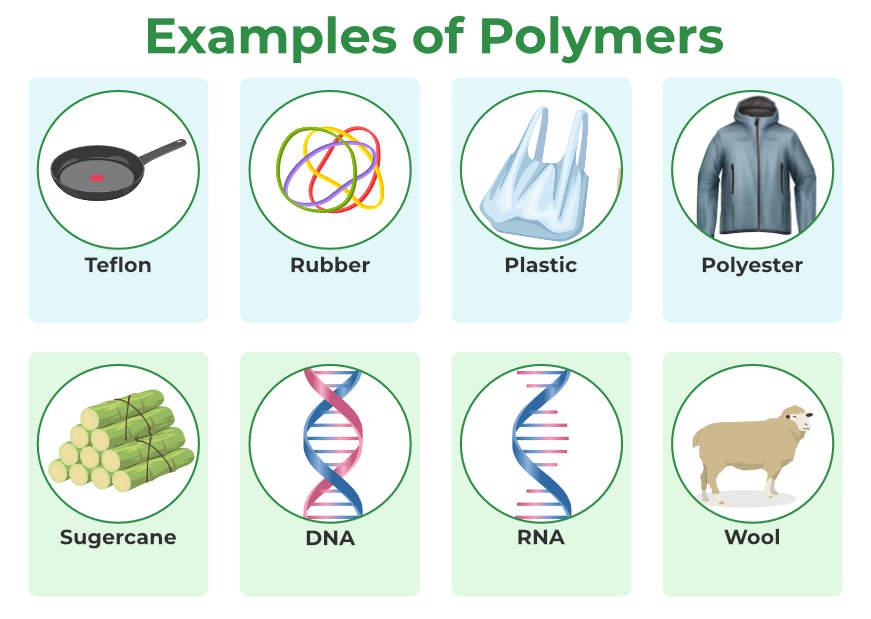>
> | IMPACT OF POLYMERS ON OUR DAILY LIVES, AND WHAT THE FUTURE HOLDS
Polymers, whether natural or artificial, are used in the manufacture of materials. The production of polymers from natural substances took off in the 19th century, the use of natural polymers is only increasing, so it had become essential to synthesize materials with properties similar and even superior to the natural products that already existed. It was then possible to synthesize molecules without using natural products.
Polymers are nowadays used in various fields: medicine, public works, the automotive and aerospace sector, packaging, textile fibers, etc.
However, plastics are not biodegradable, which has caused an ecological disaster due to the rejection of synthetic polymers in nature (in particular the pollution of the oceans).
In order to reduce the environmental impact due to these synthetic polymers, several devices have been developed.
Examples of systems put in place
- Disappearance of single-use plastic bags at checkouts in supermarkets.
- End of the marketing of plastic straws.
- Reduction of food packaging.
What does the future holds for Polymers?
In the realm of materials science, few discoveries have captured the imagination and practicality of humankind quite like polymers. These versatile compounds, composed of repeated subunits, have underpinned countless technological advancement, from everyday consumer goods to life-saving medical devices. As we stand on the cusp of a new era driven by innovation, it's worth contemplating what the future holds for polymers and their transformative potential.
The journey of polymers, from their humble beginnings to today's intricate applications, mirrors the progress of human civilization itself. From the pioneering days of nylon and polyester to the modern wonders of biodegradable plastics, these compounds have evolved to meet society's ever-changing needs. You will get enough information in this article  about the future holds for polymers. The future promises even greater strides, marked by three distinct pathways:
1. Sustainability Revolution: With environmental concerns taking center stage, polymers are at the forefront of sustainability efforts. The development of novel bioplastics, derived from renewable sources, is reducing our dependence on fossil fuels and addressing plastic waste accumulation. Expect to see innovative materials that combine the best of traditional plastics' functionality with eco-friendly characteristics, reducing their environmental impact while maintaining high performance. about the future holds for polymers. The future promises even greater strides, marked by three distinct pathways:
1. Sustainability Revolution: With environmental concerns taking center stage, polymers are at the forefront of sustainability efforts. The development of novel bioplastics, derived from renewable sources, is reducing our dependence on fossil fuels and addressing plastic waste accumulation. Expect to see innovative materials that combine the best of traditional plastics' functionality with eco-friendly characteristics, reducing their environmental impact while maintaining high performance.

2. Smart and Responsive Polymers: The integration of technology with polymers opens the door to a world of intelligent materials. Imagine clothes that adjust their insulation properties in response to temperature changes or packaging that indicates the freshness of its contents. With advancements in nanotechnology and material engineering, we can anticipate the rise of polymers that react to external stimuli, enabling a new level of customization and adaptability.
3. Medical Marvels: Polymers are rapidly revolutionizing the field of medicine. From biocompatible implants to targeted drug delivery systems, the medical community is exploring the potential of polymers to improve patient outcomes. In the coming years, expect breakthroughs in regenerative medicine, where polymers play a crucial role in tissue engineering and organ transplantation.
As we ponder the future of polymers, it's essential to acknowledge the vital role collaboration and innovation play in shaping this trajectory. Researchers, scientists, and industries must work hand in hand to unlock the full potential of these remarkable materials. Governments, too, can contribute by fostering research initiatives and incentivizing sustainable practices.
In conclusion, the future for polymers is one is bright and bleak. Their adaptability, coupled with our ever-expanding knowledge, ensures that these compounds will continue to redefine industries and enrich our lives. From sustainable solutions to intelligent materials and cutting-edge medical applications, polymers are set to lead us into a future limited only by our imagination and dedication to progress.
--  Abdul Alim - 2023-08-08 Abdul Alim - 2023-08-08
Comments
|

